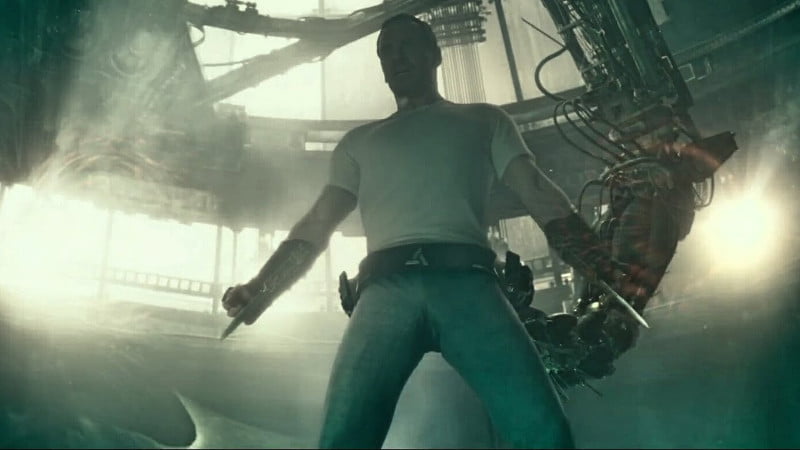To celebrate the release this Friday of Assassin’s Creed: Origins we are going to explore the series and its weird and wonderful world. Whether it be foible, folly, or flourish, we will look at the worlds, the ideas, and the studios, to revel in a decade-long franchise that’s shifted the gaming landscape. For more AC Week articles, go here.
Do you ever stop to wonder exactly what happened when the idea of the Animus system was introduced into Assassin’s Creed?
We did, and this short (fictional) script of the (hypothetical) meeting, in which the Animus is born, is the best possible explanation I could come up with:
Interior, Ubisoft HQ, late 2006.
The Ubisoft Montreal team linger nervously in the conference room, waiting for the Ubisoft executives to arrive. One of them is pacing around the conference table.
First Ubisoft Montreal developer: Will you sit down, you’re making me nervous.
Second Ubisoft Montreal developer: I can’t, I’m just so excited and terrified at the same time. What if they hate it? What if they love it? What if–
He’s interrupted by the conference doors banging open, dramatically. Four Ubisoft executives stride into the room, pairing exquisitely-tailored French suits with terrible Rayman t-shirts. A small entourage of assistants, legal advisers and marketers scuttle behind them, like remora on giant sharks.
First Ubisoft executive: We love it!
An audible gasp fills the room. The second Ubisoft Montreal developer resumes his seat, and takes the opportunity to stifle a few tears of relief.
Second Ubisoft executive: Yes, we think it’s fantastic! The Parkour, the climbing, the haystacks, the towers – all that murder – we love it all. You’ve excelled yourselves!
First Ubisoft executive: You should all be very proud of what you’ve achieved, and when the review scores are in, we’ll possibly allow ourselves to be proud of you too. Well done, team!
The second Ubisoft Montreal developer is now openly sobbing in the corner. The first Ubisoft Montreal developer clears his throat to speak.
First Ubisoft Montreal developer: That’s such a relief, thank you! We were worried that we’d come in here and you’d want to change it all, but to hear you loved it, that’s just the best news we’ve ever had.
Third Ubisoft executive: Oh, don’t get us wrong. We want to change it twelve ways from Sunday, we just didn’t want you to be disheartened.
The second Ubisoft Montreal developer is still crying, but for different reasons now.
Second Ubisoft Montreal developer, choking back tears: Whats… what’s wrong with it…?
First Ubisoft executive: Well, it’s all that history, isn’t it?
Second Ubisoft executive: Yeah, couldn’t it be a bit more… modern? Gamers like things to be hyper-futuristic, with lasers and spaceships and stuff.
The marketers are mumbling words like ‘synergise’ and ‘bleeding edge’ in the background.
Fourth Ubisoft executive: And Rabbids. Rabbids are going to be huge.
Third Ubisoft executive: Shut up, Françoise! Nobody wants to hear about your stupid rabbits! They’ll be forgotten about in a year, we guarantee it.
The first Ubisoft Montreal developer is building up his confidence to say something, and clears his throat, loudly. He stands up. In his head, he’s facing a bear and trying to make himself as big and imposing as possible.
First Ubisoft Montreal developer: Please, everyone, you have to understand. Assassin’s Creed isn’t just a game about stabbing people in the face with hidden coat sleeve knives, then jumping three hundred metres into a bale of hay and inexplicably not breaking every bone in your body, and nobody noticing you did it because you have the hood up on your super stealth coat! It’s so much more than that.
He starts to stride around the conference room. In his head, strains of La Marseillaise are rising to accompany his triumphant defence of the team’s vision.
First Ubisoft Montreal developer: Without the history, Assassin’s Creed would be without a soul! It’s not about how you climb the buildings just by holding down a button, it’s about the buildings you get to climb! It’s not about the murder, because you are an assassin and that’s what the quest-giver told you to do, but about the historical figures you get to murder! This is a living history lesson, a way to teach people the ways of the past while dressing it up as entertainment. They won’t even realise they’re learning! This is our Waterloo, and we will never back down.
The Ubisoft executives applaud, gently at first, rising into a standing ovation. The remora dutifully follow their masters, and begin clapping and whooping.
First Ubisoft executive: Well said, sir. We understand that you stand behind your vision, your commitment to the history and the very soul of the game. It must have taken immense bravery to make that stand.
First Ubisoft Montreal developer: Thank you! Thank you, it means so much to–
First Ubisoft executive: You didn’t let me finish. I appreciate your passion, I really do, but our marketing team tells us that the gaming audience is too stupid to appreciate a purely historical game. There’s a reason why they go and watch excrement like Revenge of the Sith and Fantastic Four at the movies, and not to the theatre to see a masterpiece like Les Misérables!
The first Ubisoft executive rises from his chair, looming over the Ubisoft Montreal developers.
First Ubisoft executive: You can keep your history, because we understand it is the basis for all the murdering and tower climbing, and the marketers tell us the murdering and tower climbing will go down well with our key demographic. But they need it to be more space-age, at the same time. The legal team are also concerned that you’re making this out to be real history, and we might get sued by the long-lost descendants of some historical figures. So in short, if you don’t give us some science fiction McGuffin, some half-baked techno babble nonsense to make it sound futuristic and explain away things things that don’t really need explaining for the controller-waggling imbeciles out there, then you’re all fucking fired.
He slams his palms down on the table with thunderous fury. The second Ubisoft Montreal developer has urinated in his trousers, and is crying in the foetal position under the conference table.
First Ubisoft executive: Do you understand me?
And that, kids, is how I like to think Assassin’s Creed’s Animus system came into being.
Just a quick footnote here, which absolutely shouldn’t need saying, but here it is anyway: this is a work of fiction. It describes a theoretical, fictional encounter between fictional employees of (what happens to be) a real video game company making (what happens to be) a real video game that really did get released. It’s primary function is to amuse and entertain the reader, and in no way do we want to imply that this is really what actually happened. [Please don’t sue us, Ubisoft, we’re just having a little fun – Legal Ed.]
I mean, sure, I can’t think of any other reason why the Animus system exists within the fiction of Assassin’s Creed – other than as a pseudo-scientific explanation for respawning, and to jam some science fiction into the series because the marketing team didn’t think the straight-up history stuff would go down too well with gamers – and I do think Animus is without a doubt the absolute worst part of the series, but that little script up there? That’s totally not what happened.
Probably wasn’t.
I don’t know, I wasn’t there.
See? Fiction!






